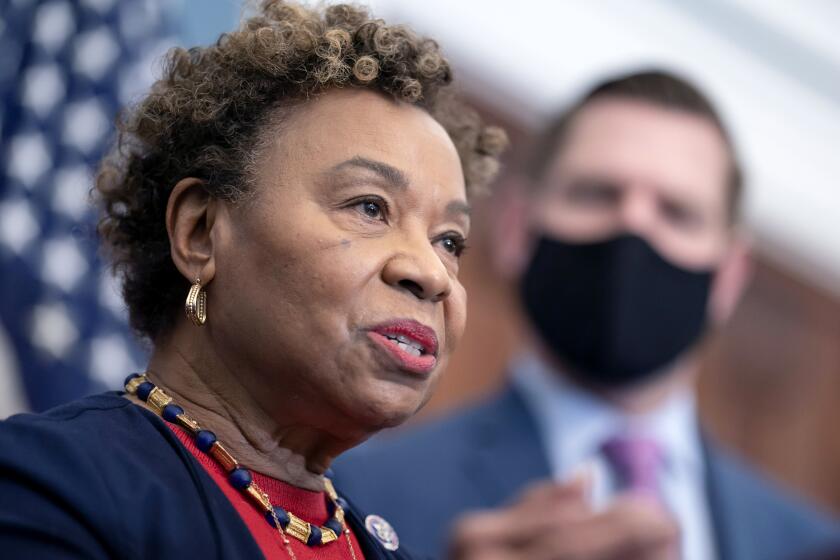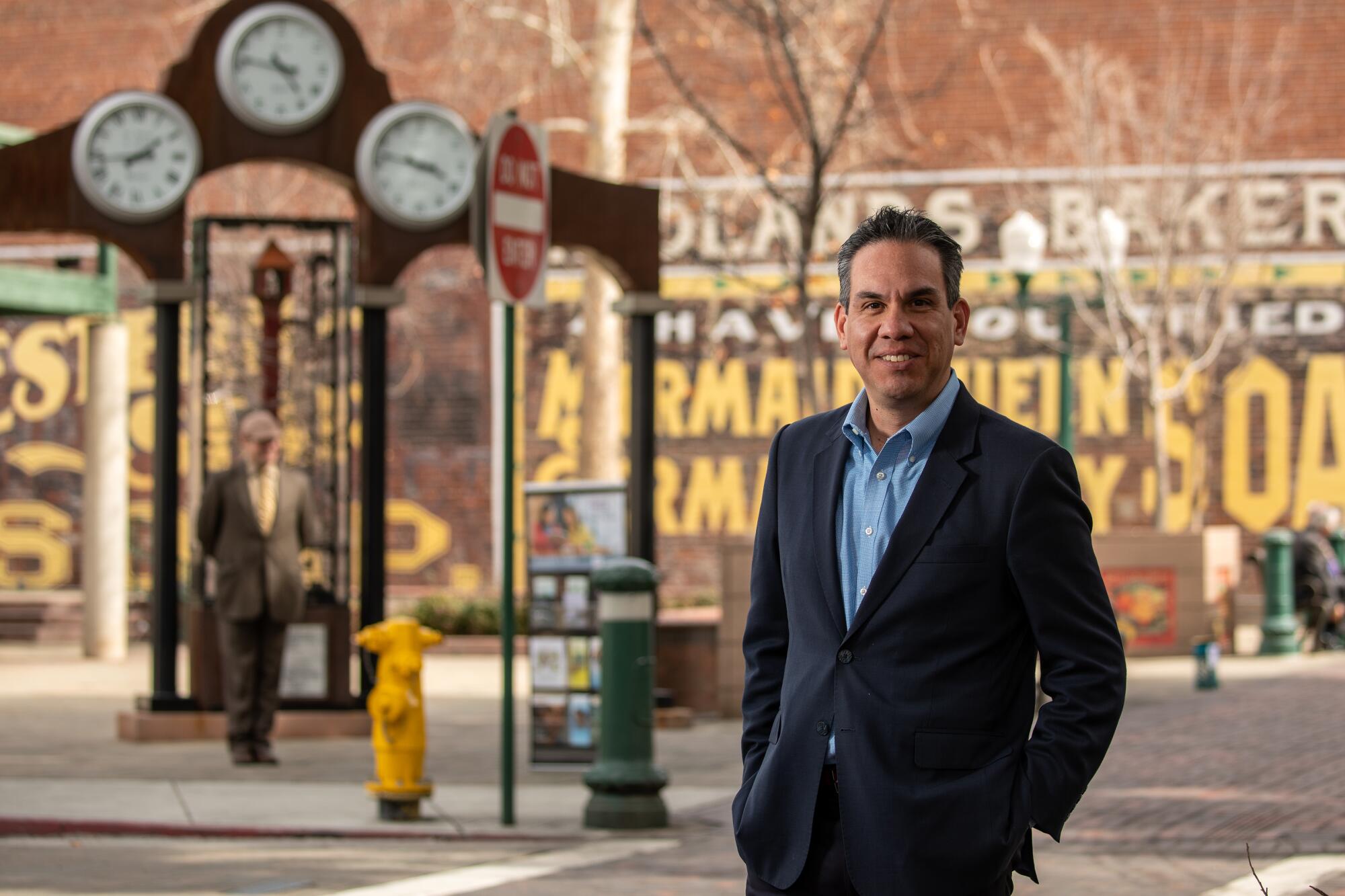
Rep. Pete Aguilar felt the threat rising.
As the House prepared to confirm Joe Biden as the nation’s next president on Jan. 6, 2021, and put an end to Donald Trump’s false claim that the election was rigged, Aguilar had a great view of the doors Capitol security would barricade to ward off the rioting insurrectionists.
Just before he left the chamber floor and fled for safety with the rest of House leadership, Aguilar scratched in a little red notebook he had picked up on a trip to Peru something that many members and congressional staff felt that day.
“I’m a little scared.”
The Yucaipa native already was a rising star in the Democratic Party and climbing up the leadership ranks. That infamous day supercharged his ascent, first with an appointment to the House committee formed to investigate the attack on the Capitol and then with his election as chair of the House Democratic Caucus. Aguilar is now the third-highest-ranking Democrat in the House of Representatives.
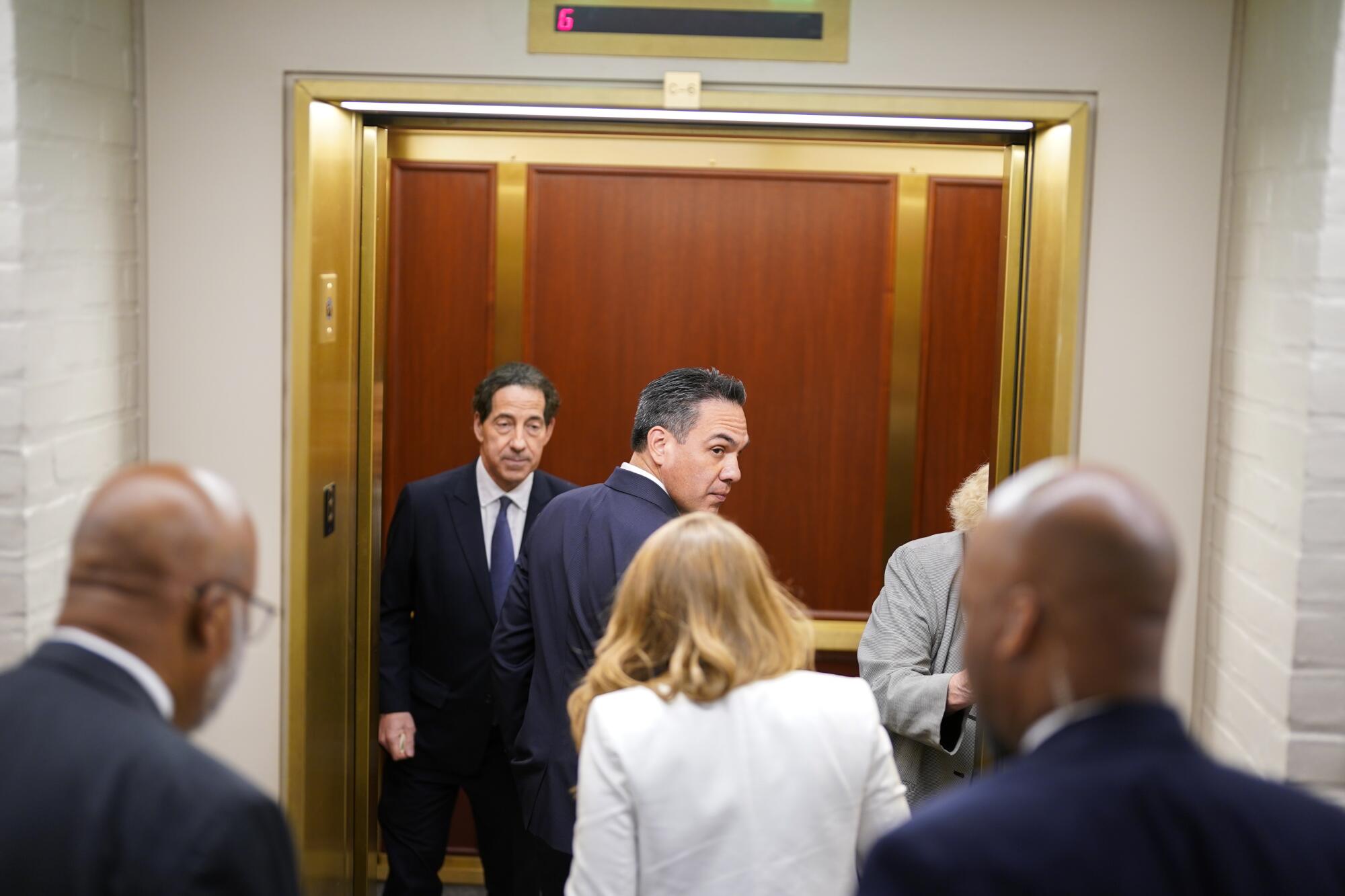
How the former Redlands mayor became Congress’ highest-ranking Latino stems from why then-House Speaker Nancy Pelosi chose him for the Jan. 6 committee, which led one of the highest-profile inquiries since the Watergate scandal took down President Nixon. Friends and foes alike note his tranquil demeanor, openness to differing viewpoints, and reputation for offering counsel to colleagues expressing complaints, concerns and compliments.
Partially because of his demeanor and the decidedly moderate part of the state he represents, Aguilar is far from an ideological warrior duking it out over culture-war issues. Instead, he’s part of a House coalition known for its pro-business bent and recently was the highest-ranking Democrat to join Speaker Kevin McCarthy (R-Bakersfield) for a meeting with Taiwanese President Tsai Ing-wen at the Ronald Reagan Presidential Library in Simi Valley.
When it came to speaking up for democracy and the peaceful transition of power, Aguilar was resolute. And on the Jan. 6 committee, which had been stocked with lawyers and members schooled in past oversight battles, he was an eager participant but a deferential listener.
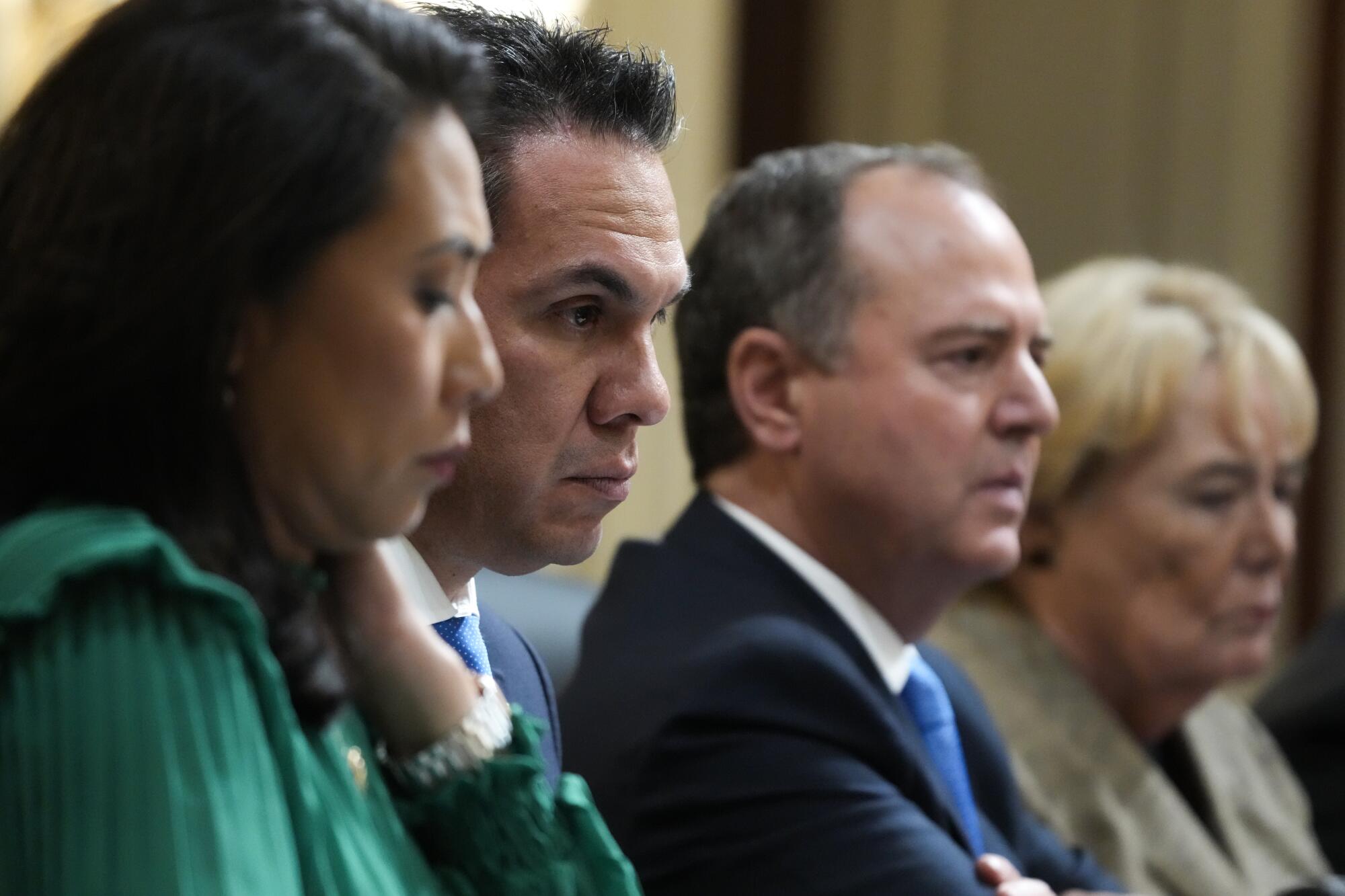
“There were times when things would start to go off the rails and Pete was always someone I could turn to, to get back on the rails. He was just very pragmatic,” said Rep. Zoe Lofgren (D-San Jose), a member of the select committee on the Jan. 6 attack who has served for nearly three decades in the House.
His tenure in Congress hasn’t necessarily elicited landmark legislation — though not for lack of trying on subjects such as immigration. Still, the Jan. 6 investigation led to a new level of prominence and credibility, the kind of notice that fellow committee members Rep. Adam Schiff (D-Burbank) and former Rep. Liz Cheney (R-Wyo.) are marshaling to run for or explore running for higher office.
Aguilar has his own ideas on how to use that newfound cachet, one more attuned to the longest-serving Republican congressman in California history — Jerry Lewis. Known as the “master of the congressional earmark” during more than three decades in the House that ended in 2013, Lewis brought millions in federal money to his Inland Empire district.
Lewis also was well liked by both his Republican and Democratic colleagues, even in a hyperpartisan climate in Washington that rivaled the animosity seen today. While serving in the California Legislature in the 1970s, Lewis crafted legislation that established the South Coast Air Quality Management District to fight smog in the L.A. Basin and backed a shield law, an amendment to the state Constitution allowing reporters to maintain the confidentiality of news sources.
Claremont McKenna political science professor Jack Pitney worked for Lewis and recalled, how at his funeral, Aguilar spoke glowingly of a man who rose to be the powerful House Appropriations Committee’s chair and head the House Republican Caucus.
“He talked about their long-standing friendship going back to when he was mayor of Redlands,” Pitney said of Aguilar. “It’s no coincidence they got along so well, because Jerry was pretty much like that too. He was not a cultural warrior. He had a conservative voting record, but he made a point of befriending people on the Democratic side.”
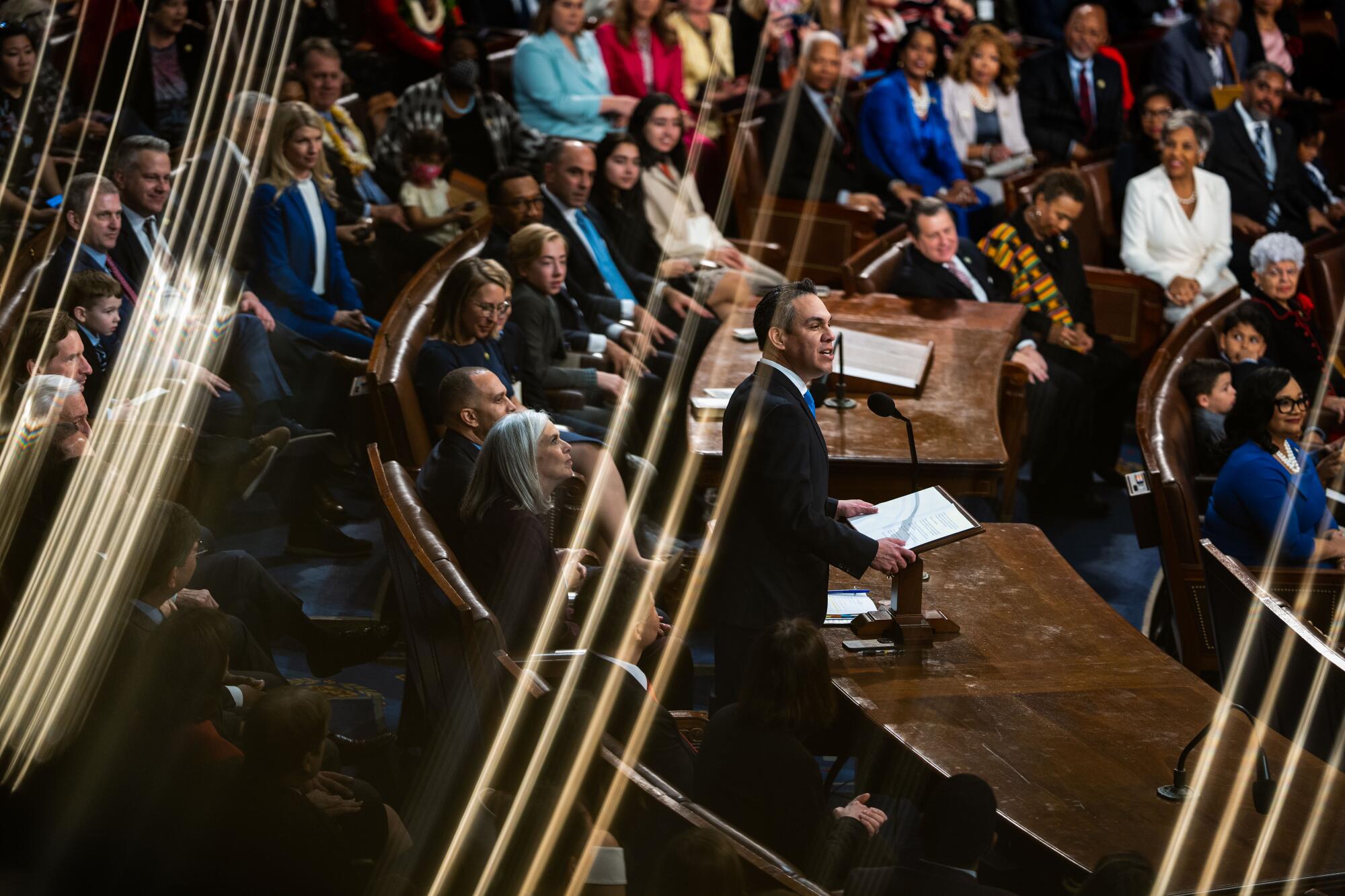
Along with House Minority Leader Hakeem Jeffries (D-N.Y.) and Minority Whip Katherine Clark (D-Mass.), Aguilar is part of a newer, younger vanguard of Democratic leaders who replaced septuagenarian and octogenarian counterparts.
Aguilar said he is content with his station in Congress. He said statewide office doesn’t appeal to him and, at 43, he’s almost a decade younger than Jeffries and about 15 years younger than Clark.
“It would be great at some point for him to become speaker,” said former Rep. Lucille Roybal-Allard, a Democrat from Downey. “He’s exactly the kind of person we need as speaker — someone who is respected, trusted and has core values that I think all of us could support.”
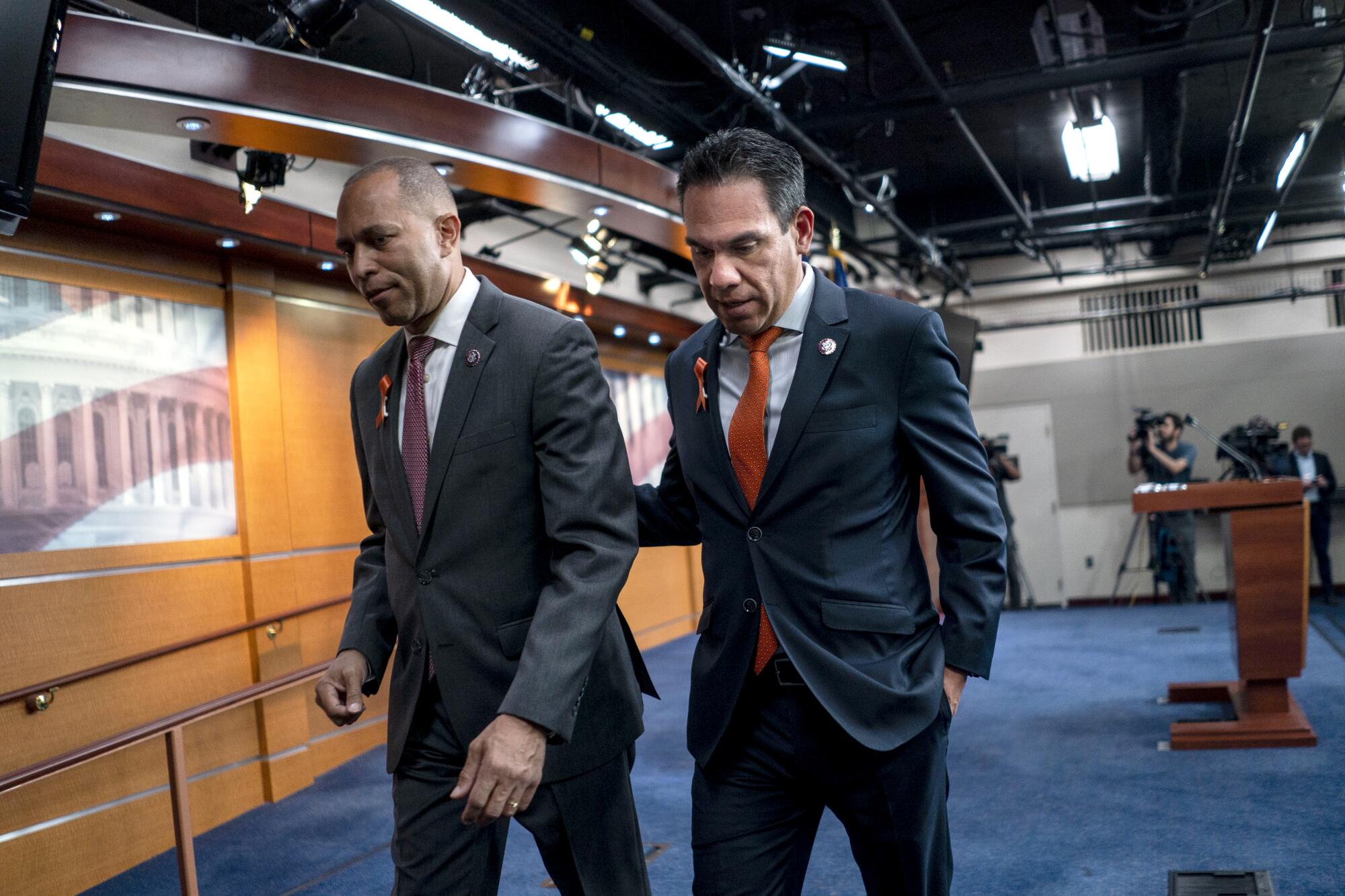
Normally agile in answering questions, Aguilar responded cautiously when a Times reporter read back Roybal-Allard’s comments. He reiterated his excitement to eventually serve a “Speaker Jeffries” and quickly pivoted to how McCarthy — the recently elected speaker — so craved the post that he bowed to the far-right corner of the GOP congressional caucus in January to win enough votes to become third in line to the presidency.
“I don’t think Hakeem is going to do this job for 20 years like Pelosi did,” Aguilar said of becoming speaker.
“Come find me in 12 years after he does this, and we’ll talk. It’s nothing I yearn for, to be honest with you,” he said, before adding: “Maybe I shouldn’t say that.”
Sen. Dianne Feinstein’s weeks-long absence from Washington has refocused attention on Gov. Gavin Newsom’s promise to appoint a Black woman if a U.S. Senate seat opens up.
Aguilar grew up in San Bernardino and Yucaipa, the son of a Southern California Gas Co. district manager who later divorced from his mother. He once told a reporter that as a kid he wanted “to work for the gas company like my dad. My mom had made me a uniform to match my dad and I wore it all the time.”
Aguilar’s interest in politics and current events began when the Exxon Valdez oil supertanker spewed nearly 11 million gallons of oil into Alaska’s coastal waters.
A 9-year-old Aguilar studied the San Bernardino Sun every day and was entranced by nightly news coverage of the disaster. Upset, he wrote a letter to Exxon’s chief executive that included a petition telling the company to clean up the spill and take responsibility. He gathered signatures from neighbors, classmates and teachers.
Aguilar arrived at University of Redlands as a member of the golf team and became popular on campus. He ran the local Habitat for Humanity chapter and was a regular presence at the basketball team’s games. Friends recall his penchant for heckling opposing teams and referees.
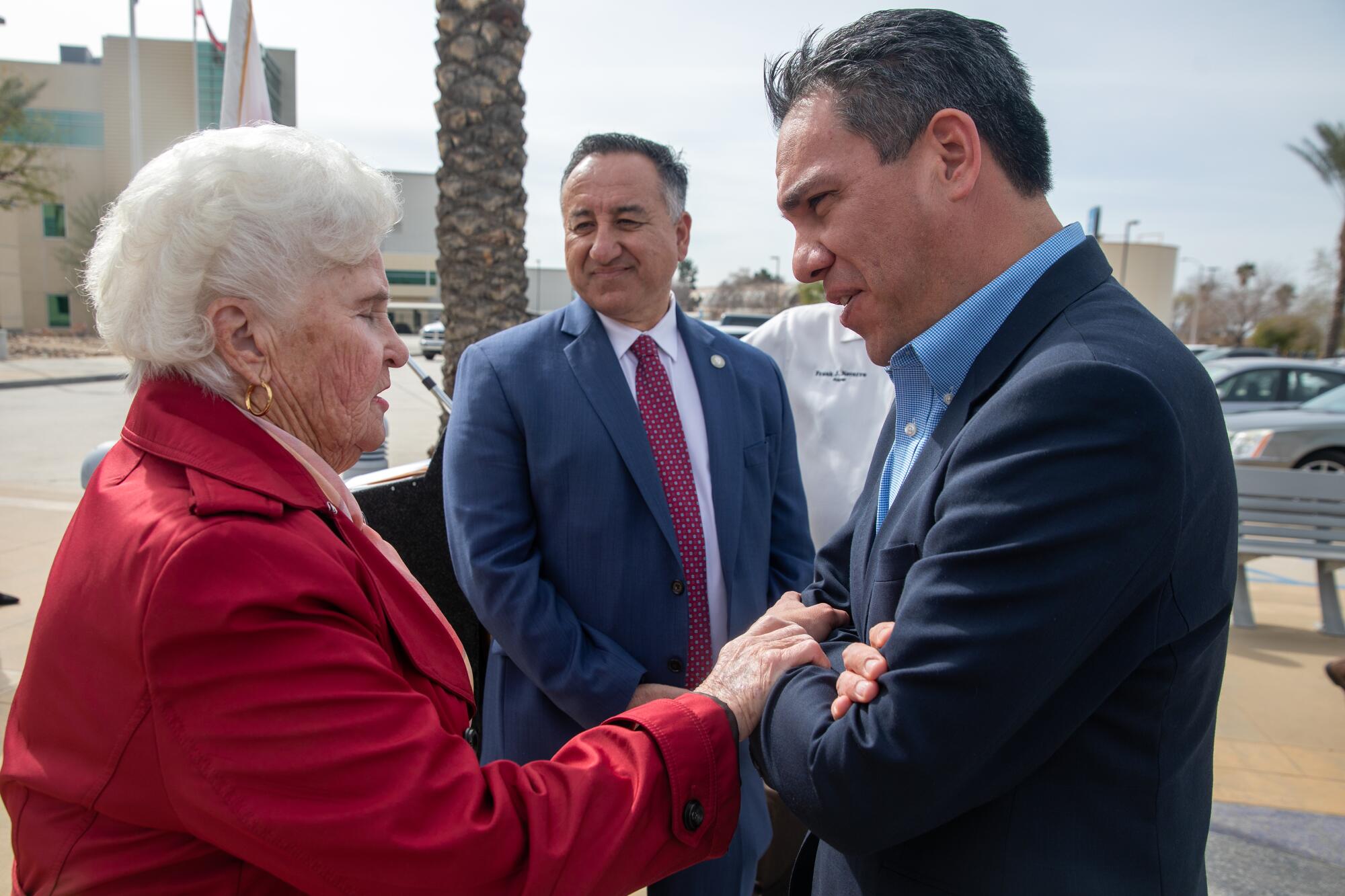
His ability to convene people and unite them started on campus, said his wife, Alisha Aguilar — a fellow classmate who now works as an administrator at the school.
“He always wanted to be in the middle of things. He went to all the basketball games,” she said. “He definitely went out a lot, had a lot of friends and had a lot of fun. He will tell you that our paths didn’t really cross because he was very popular and I was very smart, and so we didn’t really have a lot of overlap in our friend group.”
An internship in the nation’s capital with a Redlands alum also helped ignite his passion for politics. He attended the 2000 Democratic National Convention in Los Angeles at a moment when Josiah Bartlet, the loquaciously liberal president on the popular television show “The West Wing,” was a cultural touchstone. The show was appointment viewing for Aguilar and his friends and presaged a politics that was above partisanship and high on idealism.
Aguilar, who after graduating went to work for Gov. Gray Davis’ Inland Empire district office, loved the show to the point of obsession.
He and roommate Kevin Dyerly hosted “West Wing Wednesday,” where friends would crowd into their home. Chips and salsa along with some beer would be served with the volume cranked high.
“We just said, ‘Look, you can come early and hang out and have a good time. You can stay late, but from 9 to 10, you’re quiet and you’re watching,’” Dyerly recalled. “We did that for a couple of years living together.”
The show has lost some of its luster in recent years, particularly throughout the Trump presidency as the neoliberal optimism it espoused fell out of fashion. For a 20-something Aguilar, it was an influential guide to a career that until then seemed mysterious.
“I don’t know if I would be doing this without ‘The West Wing,’” Aguilar said. “I thought that it captured the idealism of working in those jobs that was really, really cool to me.”
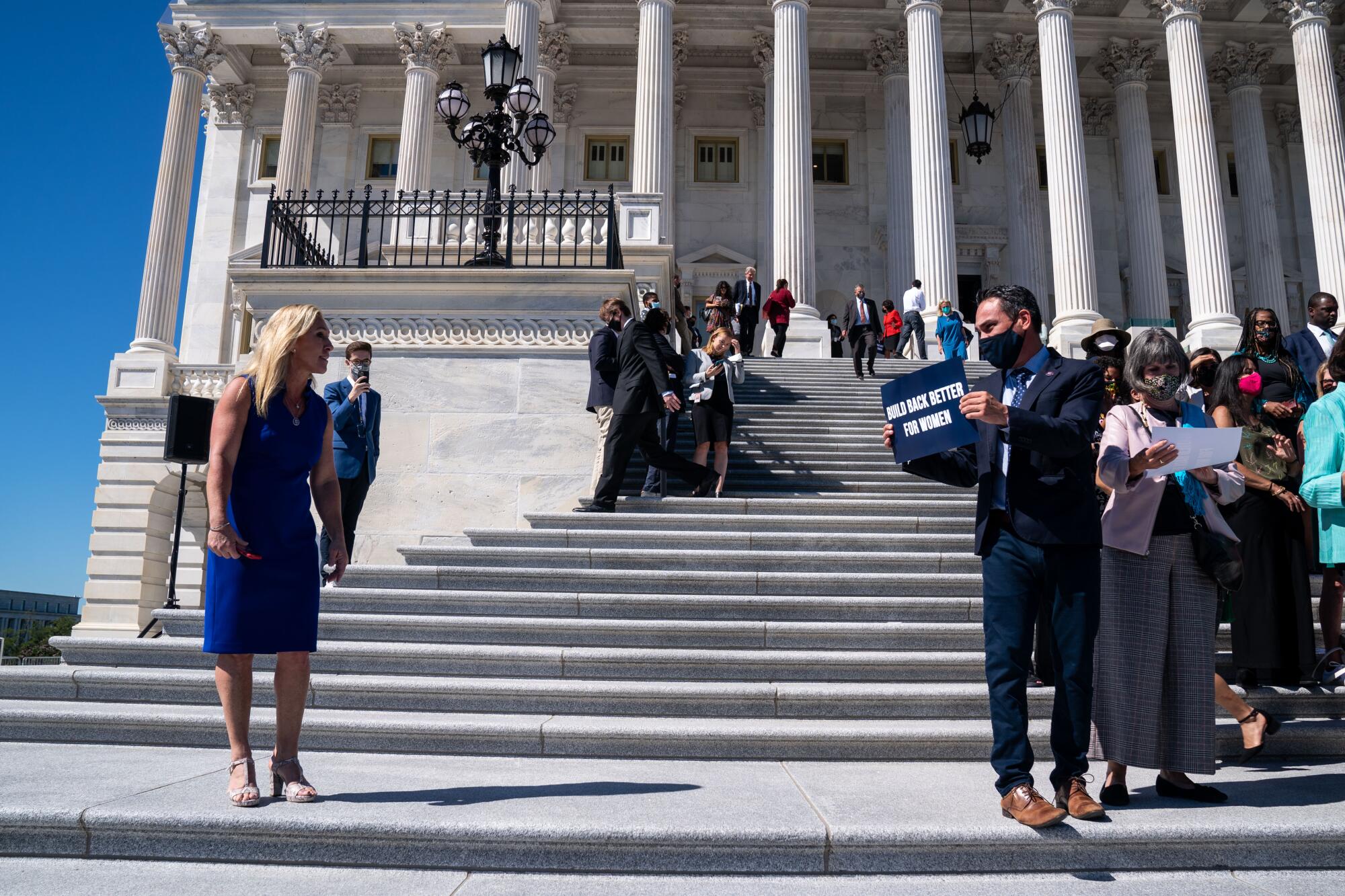
After working for Davis, Aguilar became director of governmental affairs for Arrowhead Credit Union in San Bernardino County. Around this time he also managed the campaign for a regional highway tax measure.
Then, in 2006, a seat on the Redlands City Council opened up when a member resigned.
Eleven people applied for the post, and after three rounds of voting on the appointment by the City Council, Aguilar prevailed and, at 26, became the city’s youngest councilman ever. Alisha — who had just given birth to their first child — also had encouraged him to put his hat in the ring.
As a council member and later mayor, Aguilar proved to be an adept fundraiser who advocated for economic development projects, touted his work cutting down the number of city commissions and balanced the budget.
In 2012, as has been the case throughout his career in politics, an unexpected opportunity opened up. Lewis retired and his newly drawn congressional district was more favorable to Democratic candidates.
Aguilar entered a crowded primary full of ambitious Democrats and, in the end, won only a valuable lesson in humility.
The Democratic candidates splintered their party’s vote, allowing two Republicans to make it out of the primary and Rep. Gary Miller to prevail. Aguilar returned to the City Council.
“I hate losing anything — board games with the kids or running for federal office,” Aguilar said. “It hurt. I think what also kind of hurt at the time was the Monday morning quarterbacking.”
Aguilar ran again in 2014. Chastened, he launched his campaign earlier to help with fundraising and provide more time for door-to-door politicking. The competitive nature of the district meant that figures such as then-Vice President Biden and former President Clinton joined him on the stump against a Republican who had beaten him in the nonpartisan primary.
After the 4-point victory in 2014, he’s been reelected four more times. He also joined the New Democrat Coalition of pro-business Democrats.
“Mayors have a special sort of experience. They’ve got to make things work. They’ve got to deal with all the council people. They have got to deal with the citizens. They have got to deal with everybody. Pete brought that with him to Congress,” said Rep. Steny Hoyer (D-Md.), who served as House majority leader under Pelosi.
For Aguilar, the Jan. 6 committee provided a venue for the political idealism he’d seen decades before on “The West Wing.”
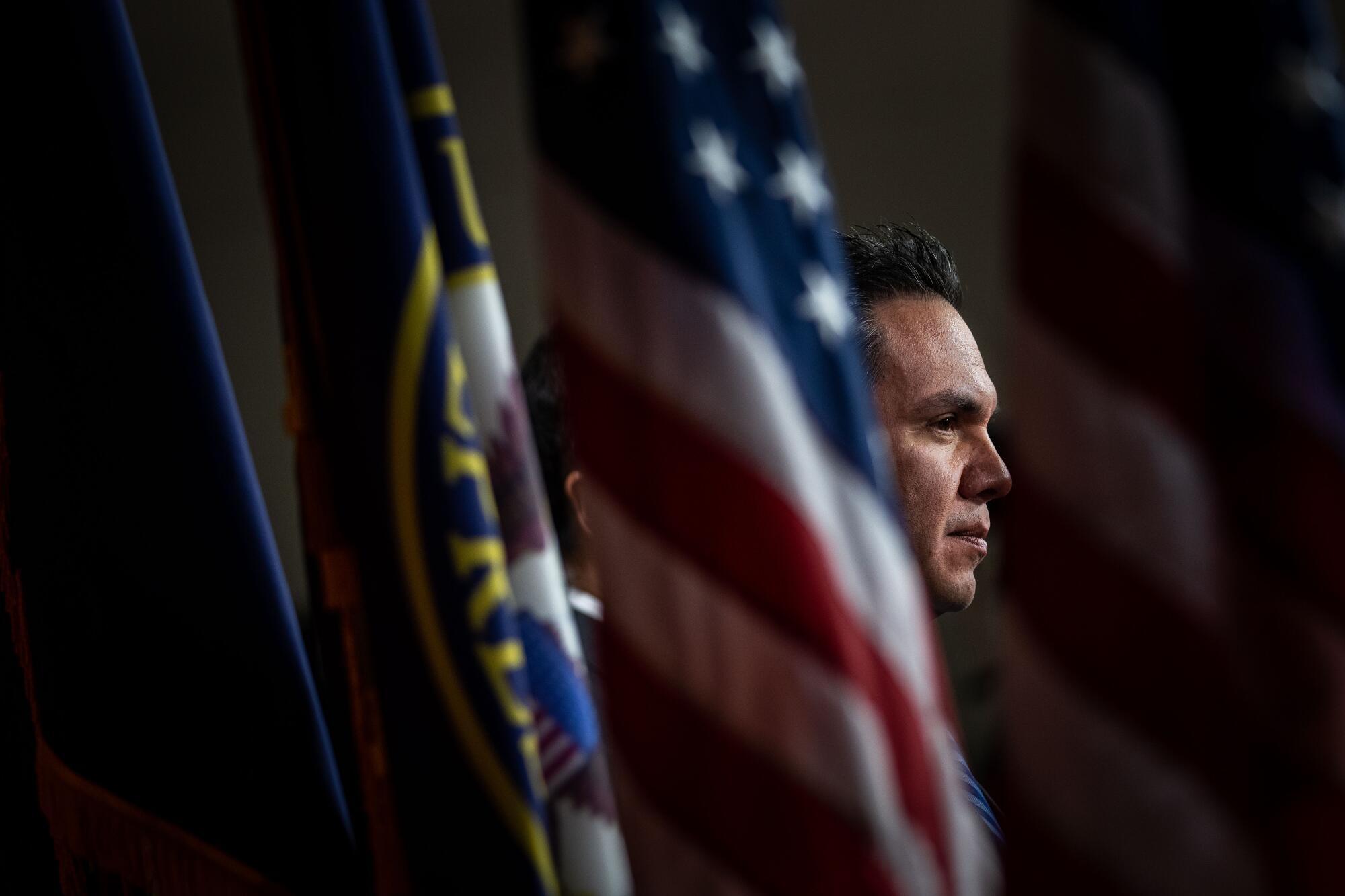
During his relatively short time in office he has looked for ways to inhabit that bipartisan comradeship inhabited on the show and untangle the political knot that has been immigration. His hope since arriving had been to find consensus on issues he cared about.
It was the closest he came to doing something big, bold and bipartisan. In 2018, Aguilar, former Texas Rep. Will Hurd and several other moderate Republicans with large Latino constituencies united to find a path to citizenship for the millions of immigrants who had been brought to America as children.
Known as “Dreamers,” there was a brief moment of bipartisan support to find a way to help a group that had won a temporary reprieve during the Obama administration.
But the opportunity fizzled and their effort failed.
Aguilar expressed frustration about not being able to overcome ideological divides and procedural intransigence of Congress such as the filibusterer. Hurd’s exasperation over the divisiveness in Congress led him to not run again in 2020.
Still, Hurd observed in Aguilar someone with the capacity, he thought, to eventually bridge some of the monumental divides in Congress.
“The difference within Democratic leadership circles and Republican leadership circles is Republicans change quite often,” Hurd said.
“That doesn’t happen on the Democratic side. So I think we’re going to be seeing Pete Aguilar for a very long time.”
More to Read
Sign up for Essential California
The most important California stories and recommendations in your inbox every morning.
You may occasionally receive promotional content from the Los Angeles Times.
